Introduction
Have you ever been confused about the difference between probiotics and prebiotics? Although probiotics have taken center stage for supporting optimal gut health, prebiotics are actually just as important (if not even more so!). This week on The Goodness Lover Podcast we spoke with Dr. Jason Hawrelak, PhD, about prebiotics and how they are key for robust immunity, better moods, a healthy metabolism, and so much more!
Watch the Interview:
Dr. Hawrelak shared:
🦠 How prebiotics benefit the immune system
🌱 How you can obtain prebiotics through food or supplements
👏 The current research on the use of prebiotics for improved mood, better blood sugar, and even autism spectrum disorder
And much more that you won't want to miss!
Additional Resources
To connect with Dr. Hawrelak and discover more of his work, you can find him on Facebook. You can also visit his website here.Transcript
Sarah: Hello and welcome back to the Goodness Lover show. Today, we're joined by Dr. Jason Hawrelak, PhD and MD, to talk about prebiotics and how they can influence immunity, your mood, your metabolism, and so much more. This call was so insightful and I'm excited to share it with you. Let's dive in.
Matt: Dr. Jason Hawrelak, you are a guru, a well-known person in the space that a lot of people refer to and you've got over 20 years of experience with the microbiome. We've been actually waiting to have you on the show for a very long time.
Sarah: Mm-hmm (affirmative). We have.
Matt: So it's very exciting for us, welcome to the show. Dr. Jason Hawrelak: Hi, thank you. It's great to be here. I always love chatting about gut health with people who are passionate about health and gut health, specifically.
Matt: Awesome. Very humble. Well, we wanted to talk to you today about prebiotics. This is, I guess, in the consumer world, a little bit of a new thing. But to you guys that have been studying this for 20 years, it's not so new. For those that have just maybe heard of the term for the first time, can you just explain to us, what is a prebiotic and how is it maybe different to a probiotic?
Dr. Jason Hawrelak: Yeah, because I think you're right, that whilst they may have been tools that I've been reading about using for 20 years in practice, but I still recall... I can go back to when I did my naturopathic training, which finished in 1999, we did almost nothing on prebiotics as part of that. Yeah, we covered probiotics in a decent amount of detail, as much as they were doing in those courses back then. But it's really when I started delving into it for my honors degree and then PhD I was going, "What are these things, prebiotics? What's lactulose?" I'd never heard of lactulose. I've never heard of fructo-oligosaccharides or galacto-oligosaccharides, which are three of the main prebiotics that we use in clinical practice. So even for me at that point, it was a major learning curve. You're like, "I don't know what these things." And you delve into it and a prebiotic is a selectively fermented substance that encourages the growth of beneficial bacteria and a selected range of beneficial bacteria that has health enhancing effects on the host who consumes them. I think that's probably the clearest definition.
So there's a few aspects of that. Essentially, they're not digested or absorbed. We eat them, they don't get broken down, they reach the colon, they are then fermented, but only selectively so. Only a few species of bacteria have got the right machinery to break those down and they can ferment them and then their population goes up because they're getting a selective food source. And then we get flow-on benefits from that because they're beneficial species essentially.
And we get more of the [inaudible] of byproducts as well. And because they can also, through that fermentation process, create these things called short chain fatty acids, we can increase the amount of that and that lowers the pH in the colon, which is actually a good thing because most pathogenic bacteria are sensitive to pH and like growing in a more neutral environment. So when we make it more acidic, we're actually discouraging the growth of pathogenic bacteria or even what we might call pathobiomes, which are species that are problematic when in high amount but they're okay when they're in the right amount and further encouraging the growth of beneficial bacteria, most of which like growing in a more acidic environment. So we get that sort of general flow-on effect from prebiotics.
But I think the term is often misused as just being anything that's a fiber is a prebiotic and that's not correct. I think a wide diversity of dietary fiber to be consumed in your diet is fantastic and helps create a wide diversity of microbes in your ecosystem. But it's a selectivity of prebiotics that makes them different. So when we eat a prebiotic lactulose, for example, we feed a limited number of species like faecalibacterium, like bifidobacterium, lactobacilli in higher amounts, and Akkermansia, for example. Those four are the ones that tend to go up pretty exclusively actually in the vast, vast majority of patients. We also have a decrease in levels of species that are more problematic, more pro-inflammatory, like proteobacteria, and bacteroides, for example, with their consumption. Now, differentiating that from probiotics, which is going back to your original question, was probiotics are a live bacteria that when consumed have health benefits on the host.
So what prebiotics are doing is they're really encouraging your own indigenous population in your ecosystem to be healthier versus a probiotic is a supplementary live bacteria that is a temporary resident of your gut, but then has health consequences when it's consumed and for potentially duration afterwards. But prebiotics are really encouraging your own individual unique microbes of your ecosystem because I think sometimes we forget that your ecosystem is unique. Just like your fingerprints are unique, your ecosystem is, so your strains of bifidobacteria are different from other people's strains of bifidobacteria. Taking one in the supplement can't necessarily replace your indigenous populations. What I like about prebiotics is they are encouraging your own bifidobacteria strains to become more dominant in that ecosystem, your own faecalibacterium strain to become more dominant.
Matt: Well, if you weren't convinced that Jason's the guru, I think in that first opening your...
Sarah: Belief is there now.
Matt: The belief is there right now. So if someone's like, "Okay, cool. I want to increase these and I want to support this population within my gut," what do I eat then? Is it anything that I can do to actually impact by increasing prebiotic foods or whatever certain activities? Tell us more about that.
Dr. Jason Hawrelak: Yeah. Prebiotics, you can either do essentially as a supplement or as foods. We're lucky that a lot of food stuffs that we have access to contain decent amounts of prebiotic compounds. I look at what are technically referred to as inulin-type fructans, which are also more commonly known as fructo-oligosaccharide or FOS. I might just use FOS because it's much easier to say from this point on moving into the future. Now, FOS comes in very high levels in onions and garlic and Jerusalem artichokes, which commonly called fartichokes because of their content of FOS. Because it's indigestible, it reaches a colon, feeds beneficial bacteria, but they do increase gas and that's probably the main side effect that's consistent across prebiotics in general. There are exceptions, some are a little bit more prone to causing gas than others. But in general, they all enhance gas production.
Yeah. So we can make sure we're having onions and garlic, Jerusalem artichokes, globe artichokes, and certain food stuffs that used to be part of our diet as people from a European background, but less so now. That would be things like burdock root or dandelion root. That used to be like, "Oh, at springtime, we'll go harvest dandelions, or the autumn moving into winter we'll harvest burdock roots," which are quite high in England, in fact. Same with dandelion roots and dandelion leaves. But because they taste bitter... Western taste buds, they're like, "Whoa," don't want to go through anything bitter, sadly.
Chicory root. Even that Chicory beverage that we have is actually quite high in inulin-type fructans. There are some more sort of lesser consumed foods like jicama roots and yacóns, Peruvian ground apples, that are also really high in inulin-type fructans. Yacóns grow really well. They even grow here in Tassie, but they grow even better as you move your way further north from Tasmania. They grow these lovely big tubers that you just peel and you can just slice and they've got the amazing crispiness, but they're really... I got to think it's like 10% or 15% inulin, so it's very easy to get a therapeutic dose. Jicama roots you often find in more Asian grocers because they're... again, you can grow them in warmer parts of Australia, but they're not commonly grown. But this lovely big tuber of a leguminous plant which is somewhat unique. Again, really nice just sliced up raw because they've got that sweetness, because inulin-type fructans are quite sweet.
Now, with things like dandelion, there's all these other bitter factors that kind of override that sweetness to make them slightly less pleasant for Western taste buds. But it was something that we consumed a fair bit of. And the other probably category of food stuffs that contain a good amount of prebiotic compounds are legumes. Legumes contain, in general, good amounts of galacto-oligosaccharides. That's slightly different than the fructo-oligosaccharides, which are made up of sort of branching fructose molecules and attached in a way that our digestive system can't get at them. And with galacto-oligosaccharides, it's galactose. Sugars that are kind of joined in a way that we can't break apart. Again, it reaches the colon, feeds bifidobacterium and faecalibacterium, more specifically, when it comes to galacto-oligosaccharides.
But, it's really legumes. There's small amounts in beets, beetroot, and small amounts in sunflower seeds and peanuts and some broccoli, cauliflower type family foods as well. But legumes are really the powerhouse. By eating a cup of legumes per day, you can actually get a therapy dose of the galacto-oligosaccharides in. I've got particular love of legumes because you're getting that lovely source protein. You're getting those oligosaccharides, you're getting resistant starches, you're getting polyphenols if you're using black legumes or redskin legumes, for example, and other soluble fibers. So really a single food that can nurture the ecosystem in many different ways, it's hard to beat legumes.
Sarah: Well, that is fantastic news because I do love my legumes. All of them. I don't discriminate. I think it would be awesome to talk a little bit more about the benefits of feeding our bacteria via prebiotics. You mentioned before the call that there's a strong connection to immunity which everyone obviously is more interested in at the moment. Could you tell us a little bit about how that works?
Dr. Jason Hawrelak: Yeah. I think some of the research was done probably initially on probiotics in immunity initially, and showing that. There is good research that's flowed on from that in the last 15, 20 years showing that ingestion of probiotics... there's some strains that are probably more effective than others, but in general, can up your non-specific immune response, protect you against getting respiratory tract infections and reduce their duration. I think there's a Cochrane review in... I think it was 2015 that found a 47 percent reduction in respiratory tract infections for people taking probiotics daily and a 1.89 day reduction in symptoms. So, that's two days less when you're taking your probiotics, so that's pretty substantial.
The good thing about that kind of immunity is that it's... your body, it's not like it only protects you against one or two different types of invading organisms. It ramps up that non-specific immunity that's sits at the ready to protect you against any kind of virus or any kind of bacteria that you're actually exposed to. So, I think there's that research that came out first and has certainly continued to build upon that which is why there's a number of studies looking at the potential of probiotics for COVID prevention and treatment, for example. Most of which, as far as I'm aware, haven't actually come through with clinical trial results yet, but they're in the offing.
But then there was research on prebiotics. The first study I found was looking at fructo-oligosaccharides. It was used as a supplement and it was given to toddlers. Toddler age group is a fantastic group to study because they get sick a lot. Toddler aged kids typically are going to daycare. This is what the study probably actually did. They get sick 10 to 12 times a year, versus an adult that might be two to four. It's much easier to see a change when they get sick that often. So, even a 50 percent reduction is really noticeable, but going from two to one? Less noticeable in adults. So, we often choose that population because it's much easier to see changes in.
Yeah, there was about a 50 percent reduction in respiratory tract infections giving one teaspoon of FOS per day. This stuff, it tastes like white sugar. It's amazing. It tastes like cotton candy, actually. It's really easy to give kids. You don't get compliance issues with 99.9 percent of kids. The occasional kid, it's too sweet for their taste buds, but most would be quite happy to take it. I've had parents who... they're just blown away because their kid was going to daycare, they're getting sick every week, then the parent can't go to work because their kids are sick and it has a huge impact on their life. Every time that it does get better, they get sick again. It's driving them mad.
Then you see them and you're like, "Okay, just take this one thing." Not changing anything else in your diet, not doing anything else in your routine. Just giving one teaspoon a day of FOS and they came back months later going, "It's a miracle. I can't believe this white sugar had such an impact. They're just not getting sick anymore." When that study first came out, which I think was in the mid 2000's, it became the mainstay of my immune practice particularly for kids, but even for other age groups as well because it just worked so well. It still is.
I think there's another study looking at it at that kind of age group as well showing, again, similar results of decreased fevers, decreased [inaudible], decreased... I think 90 percent reduction in lost daycare days, so they didn't miss many days of daycare versus kids in the placebo. So, a massive reduction. And then the flow-on effect of that is the parents can work and they can make money. All the other things that go with when your kid is sick. Never mind just the fact that they're sick. It's mostly an inconvenience when it comes to respiratory tract infection, typically.
Yeah, so you can see all those other flow-on effects that come from that. For me, it's been a mainstay at my practice, really, since that time and it has maintained that way. There are certainly with adults... they'll use herbs like echinacea or andrographis. Tulsi basil and guduchi, for example, to enhance immune response. But, I still go back to using prebiotics as a core part of that. With kids, it's mostly just that because it's such an inexpensive, effective option. You can give one tub of FOS, you might buy it for $12, and it does you for three months, so it's very inexpensive. Compliance wise, easy and effective.
Sarah: Incredible. Man, I wish we had that when we were in Bali. We lived with two kids that were at daycare and just... we don't have children, so this was our first experience of the kids getting sick. They'd come home, one would have it, then one by one, all the adults would fall and then the kids would get better, back to daycare, get sick again, and we'd all... again. I've never been as sick in my entire life as that year when we lived with those children.
Dr. Jason Hawrelak: I could imagine. Yes.
Sarah: It is just the fructo-oligosaccharides that have been linked to immune function, or are there more prebiotics [crosstalk] study?
Dr. Jason Hawrelak: Yeah, I would say that the FOS has probably got the best research in the area, but there is some research on galacto-oligosaccharides as a supplement as well. The study I can think of was looking at older adults. I think they were 55 or above and they were looking at infection rates. They were looking at impacts on immunity. They found that by giving them a supplementation, I think it was five and a half grams of GOS per day, there was an improvement in non-specific immunity and a decrease in inflammatory markers body wide, which is also a benefit because I think when we're looking at... again, relevant for now, it seems to be that hyperimmune response that's involved with severe COVID versus mild COVID that has these very high inflammatory markers, things like interleukin-6 or tumor necrosis factor alpha. The research on GOS in this age group was that they decreased those two parameters specifically by enhancing non-specific immunity, which should flow on to improved infection resilience as well. But, I don't think the research has necessarily gone through to that stage. So, I still prefer using FOS mostly, although I will still use GOS or a combination thereof.
Then the other prebiotic that I really like is lactulose which we can't get as a food source, unlike the other two you can take as supplements or as food. Lactulose is a semi-synthetic version of lactose where they've essentially boiled lactose and it changes the configuration of the bond so it's not digestible to everybody, whereas lactose is arguably nondigestible to 80 percent of the adult world's population. It is to some Northern Europeans who have, essentially, a genic defect that allows them to break down that lactase, whereas lactulose is essentially indigestible to everybody, so it reaches the colon. Again, very selectively fermented.
There's not so much immune data that I've seen around lactulose, so it's probably not the one I would use most in that area. It should be helpful given it has a similar effect on the microbiota as inulin FOS, but without the clinical trials, I will stick to using the ones that have got the higher quality data and keep using lactulose for the changes in the ecosystem that it induces, because there's quite potent capacity to increase levels of beneficial bacteria and decrease levels of pathogens in the gut I'd argue even more so than FOS or GOS, but it doesn't have the data on immunity as of yet.
Sarah: Very interesting. Thank you.
Matt: I guess I'm just trying to get my head around this because it just seems so bizarre to me that something that... a prebiotic can have such a huge impact on the immune system. Is the mechanism behind this well understood? Is it something that's really emerged in recent years or it's something that we still don't fully understand?
Dr. Jason Hawrelak: You might argue we don't fully understand. There are postulated mechanisms there and part of that is obviously to do with that shift. Probably the core aspect is that shift in balance, is that when we increase bifidobacteria, increase faecalibacterium, and decrease levels of pathogens and pathobiomes, we alter how the microbiota interacts with the immune system. 85 percent or so of your immune cells are in your gut, so the capacity of microbes to interact with your broader immune system is actually quite substantial. If we change the composition of the ecosystem, then we're actually changing how that interaction plays out and we're taking away a core pro-inflammatory driver. Those proteobacteria, for example, which are a classic group of pro-inflammatory bacteria in the gut... when their population goes down, that essentially takes away a lot of inflammatory stimulus that your body would otherwise have to deal with.
Matt: Interesting. So fascinating. Outside of foods, is there any specific... has any studies been done on lifestyle factors? Exercise or meditation. I don't know. Is there any sort of intriguing things that you've seen that-
Sarah: While we're on the topic of-
Matt: While we're on the topic-
Sarah: ... of immunity.
Matt: ... of immunity and also just the positive impact on our microbes. Because I think people will be thinking, "Oh, I just need to take a supplement," but they're not thinking about that holistic picture of themselves. I'd be interested to see what you've discovered in that area.
Dr. Jason Hawrelak: Yeah. I think you're right that... I'd rather people just take a prebiotic rather than not, but I think it's better if you can change diet. Again, if we're looking at a healthier microbiota composition, we're looking at diversity of microbes and how do we get the best, most diverse ecosystem? We eat diversity of whole plant food, diversity of fibers, diversity of those color compounds in plants called polyphenols. That's really the best way of increasing the level of beneficial bacteria as well as diversity of that ecosystem.
So, I think that probably plant-based, Mediterranean-style diet is really key here for promoting the healthiest microbiota composition possible and for balancing it at that pro-inflammatory, anti-inflammatory... compose the ecosystem because I think that's a good way of looking at the gut and certainly it's the way I do when I do a microbiota analysis. We're looking at what species are pro-inflammatory, which ones are anti-inflammatory, which ones kind of go in the middle but can be pro-inflammatory if there's too much or can be anti if they're in the right amount. So you're looking at that and going, "How can we adjust that?" Yes, prebiotics are a component of that and in some patients who are more resistant to dietary change or have other [inaudible] going on that make dietary changes really tricky because of symptom flares, it's something that we might work with prebiotics more gently to start with, et cetera.
But the whole aim there is, and I think in an ideal situation, yes, we want to work on that diversity of the diet. More whole foods, avoiding processed foods altogether, lots of nuts, seeds, fruit, veg, legumes. Whole grains I think are key even though they're often demonized in some parts of the blogosphere at the moment. Fruits and legumes and whole grains, for example, I think are often demonized in certain circles. But from a microbiota perspective, legumes and whole grains are actually really good for a microbiota composition. Fruit, fantastic for gut health as well.
Yes, while isolated fructose is problematic from a blood sugar perspective and a microbiota perspective, fruit containing an equal amount of fructose is not and actually encourages the growth of beneficial bacteria. Sometimes we get really reductious. Fructose bad, therefore fruit is bad. It's like, no. No, it's not like that. Yeah, so I think it's really trying to get around some of that mythology that's out there around those foods and encourage our patients to eat those things again. Yes, sometimes people have issues with gluten. Fair enough. There's a certain proportion that definitely do, so maybe eating gluten-free whole grains are the goer in a decent proportion of people, for example.
I think there is research looking at Mediterranean-style diets being protective against depression and a range of cancers and cardiovascular disease and even, I think, a range of autoimmune diseases as well. I think that is kind of a core strategy that's protective from a whole range of different things to do. Yes, I think there's good data around moderate amounts of exercise helping improve immunity. This isn't an area that I've spent too much time going into. Just trying to keep up with the microbiota, prebiotic, probiotic research is enough to fill every single minute of every single day.
But there is good research on... exercising moderately reduces your risk of developing COVID and severe COVID, for example. Eating a Mediterranean diet protects yourself from developing COVID based on the data that we have. People aren't talking about those other factors, sadly, as much as what they should be at the moment. Other things you could do to keep yourself healthy and your immune system working well. Other things like vitamin D status and zinc status are other things which... a little bit outside the question, but I think they need to be considered when looking at optimal immunity because many of us are stick inside all the time. Some, like me, live very far from the equator, so we can't make vitamin D for six months of the year. If we're lucky enough to escape, like I did up to North Queensland, soak it up for a month, then I can store up enough to get me through the winter hopefully. It's spring right now. I can get out there and get some sun again and make some vitamin D.
Matt: Awesome.
Sarah: Great tips. Thank you. I can just imagine someone's getting excited about prebiotics, but they're like, "Fructo what?" They're trying to write it all down. Is there any tips, I guess, as to how someone would actually purchase some of this if they've never even heard these words? Where do I find this? How do I purchase, I guess, if they're going down the supplement route to start off with?
Dr. Jason Hawrelak: Yeah. It's a good point and I think because they're not widely discussed and there's not even that many products around them comparatively. You look at the amount of probiotics that are out there. Huge and ever-growing. Prebiotics, they're growing slowly but the amount of space they take up on our typical pharmacy or health food shop would be pretty minor. Pharmacies sometimes don't even have them at all, I would say. Health food shops might have inulin FOS. A good naturopathic dispensary will have a whole range of them from lactulose to fructo-oligosaccharides to galacto-oligosaccharides to partially hydrolyzed guar gum which are probably the key prebiotics that I would use in practice and have a good research based around them.
Our naturopathic dispensary here in Hobart has a wide range of... two different types of galacto-oligosaccharides and a couple different types of lactulose in different sized containers, et cetera. We're pretty fine tuned in that way. There's even different types of FOS from long-chain to short-chain to in between combinations that are more nuanced usage. Again, we've got the whole range, but that would be more rare. You might have to ask your health food shop to specially order it in or you look online for... I know there's suppliers like Morlife up in Southeast Queensland that will sell kilogram bags of fructo-oligosaccharides, for example, as a ways of getting it. So, that's certainly a possibility, as well.
The only caveat there, as I mentioned before, is just the gas factor. Just beware. My general rule with prebiotics is start low and go slow. Maybe a therapeutic dose is one teaspoon. Well, start with half teaspoon a day for the first week. Then if it seems good, then go to the full teaspoon a day for that point onwards. There is a dose response. You get better shifts in ecosystem composition with higher doses in general with prebiotics. But you don't want to start with hard doses because you're going to get a lot more gas-related symptoms. But you start low, your body tends to adapt. So yes, your flatus level will go up for the first week and then it tends to peak and go back down, and then you can go up to a higher dose, it will peak a bit, and then it will go back down with that. So I think just keep in mind start low, go slow.
Some people might start with a quarter teaspoon and it'll be fine, whereas others can easily start with a teaspoon without any issue at all. Maybe a slight increase in flatus. But if you do have issues with bloating or distension or pain or cramping with them, then it really means there's something wrong with your gut and you should get that sorted is what I would suggest. It doesn't mean there's something wrong with those things, it means there's something imbalanced in your gut that's not allowing your body to deal with the gas that's being produced properly.
That can be things like SIBO, small intestinal bacterial overgrowth, it can be constipation, slow transit time, and it can be visceral hypersensitivity where the nerves in your gut are hypersensitive so even a small amount of gas causes pain and if you increase that gas production, they're like "Oh, I feel a horrible pain from that." Yeah, you can blame that or you can blame legumes from a dietary perspective, but why are you getting symptoms from that when you should just be farting more? Really. That's what's supposed to happen when we have these gas-forming oligosaccharides, is just let out more flatus, particularly when we're first getting used to it. I think it really means you should see a practitioner and delve into why you're getting those symptoms because it does flag that there's something wrong with your gut. It's not behaving the way that it's supposed to. I should flag too that there's increase in flatus but it's usually less smelly. So, that's a good takeaway.
Matt: That's a good thing. I can just imagine all the conversations. People are going to health food shops going, "I need to get some... I'll come back. I'll get my notes from the Goodness Lover podcast."
Sarah: They're just pulling up the podcast again trying to write down... I need to get this. Can you listen?
Dr. Jason Hawrelak: Fructo-oligosaccharides.
Sarah: Awesome. Thank you.
Matt: Before the show you also mentioned there's some really exciting research around mood. I'm very interested in that so I would love to pick your brain on why prebiotics are important for mood.
Dr. Jason Hawrelak: Yeah. I think it is a very exciting area. I think it again goes back to when we were starting to look at the gut microbiota having far-reaching tendrils outside the gut into other areas like the nervous system and how your brain functions. You would have said that 15 years ago, people would have gone, "No, you're crazy. There's not that connection there." But then you get research like... I think there's a 2016 paper where they took fecal matter from depressed people, gave it to rats, and those rats become depressed. It's just pretty mind-blowing that we can actually shift that. Even in isolated case reports of fecal microbial transplants to treat something like C. diff, they got a fecal transplant from someone who was a beast, and then that person becomes a beast despite no change in diet, no change in lifestyle, no change in exercise. That back stuff, that kind of animal research.
There's data around the importance of changing the microbiota and the repercussions of that, but yet looking at the gut stuff or the brain/guts connection is probably more recent around that. That kind of [inaudible] showing that, okay, we change the microbe we change the brain, has really led to an expansion of research around probiotics for mood and prebiotics for mood as well and looking at the microbiota composition of depressed, anxious people versus healthy controls. There's certainly still early days in the data collection here because, as I mentioned before, everyone's ecosystem is so unique that when you have a study with just 30 people in it, it's really hard to see patterns because everyone's ecosystem is so different to begin with, it's only when you start including hundreds or even thousands of patients that you start really seeing patterns with specific disease states more clearly.
Yeah, so it's kind of we're early days, we're seeing things build up, but some research has certainly shown higher levels of proteobacteria, which is a pro-inflammatory group of bacteria that I mentioned before in people who are depressed and anxious. That's important because proteobacteria, they grow something called endotoxin. Just like we grow hair, we grow nails, they grow endotoxin. They're not doing it to make us unwell specifically, but it does. They would release that because they're constantly breeding up and dying. When they die, they kind of release that endotoxin. About 80 percent of the cell wall is endotoxin. That gets absorbed and that actually changes the inflammatory [inaudible] in the entire body. Your whole inflammatory level goes up a notch. With more endotoxin in your system, the more your inflation goes up. Endotoxins damage your blood brain barrier and they even change the neurotransmitters your brain produces because it causes neural inflammation.
It's pretty amazing stuff. There's some fantastic research where they took happy, healthy people, gave them a dose of endotoxin, and for four or five hours afterwards, they are anxious and depressed. This acute response in people who were happy and healthy before that. Yet we've got people, through their dietary choices and potentially lifestyle factors as well, have this chronic absorption of endotoxin. It's happening 24 hours a day and then higher amounts after certain meals, for example. That floods their system, or after even alcohol use, too, you get a flood of endotoxins hitting your whole body and your brain after that.
That changes your mood and it causes low level systemic inflammation. Your body's constantly at this kind of low level inflation which we now see is a core component of obesity and type 2 diabetes and metabolic syndrome. The same things we see as risk factors for COVID, too, for that matter, is this is sort of low grade, chronic inflammation that's kind of there body wide. But yes, the endotoxemia is what it is referred to and the low grade endotoxemia is called metabolic endotoxemia. It's immensely common in people eating Western diet which, again, is correlated with high rates of depression, anxiety, compared to a whole food, Mediterranean-style diet that protects you against developing depression and anxiety.
So, it's a lot of data around that. Plus, there's research on prebiotics for decreasing stress response so that it will decrease that [inaudible] cortisol, for example, when we take galacto-oligosaccharides daily. Galacto-oligosaccharides have also been shown to decrease anxiety as well when taken in larger amounts, around the five to six grams per day mark. Decrease anxiety scores in patients, too. So there's hard clinical trial data, there's good data around changing the ecosystem to reduce levels of pro-inflammatory species, increase levels of gut healing. Body wide anti-inflammatory species too, because I think we have to remember that, I linked to this before... around the composition of the ecosystem really determines whether you're getting an inflammatory driver from your gut ecosystem or anti-inflammatory drivers and we take prebiotics where we shift that balance. We're getting more of the anti-inflammatory drivers from species like bifidobacteria, species like faecalibacterium.
That pans out in the sense that you're less potent to stress response to an external stressor, and it pans out in terms of potentially changing our neurotransmitters as well because we're taking away those systemic inflammation inflammatory compounds like the endotoxins which we now actually can change the way that tryptophan gets shunted in your brain. So, it doesn't go into becoming serotonin, it gets shunted down to another pathway called kynurenine pathway which doesn't make the happy compound serotonin.
Matt: Wow.
Sarah: Yeah, wow. Fascinating. Fascinating stuff. I feel like you've dropped so many bombs in that that I just want to keep... where can we go? There's so many interesting things.
Matt: Man, so my pumpkin seeds I'm eating every day. I'm getting all this tryptophan and then-
Sarah: But if you're inflamed, it's not going to become serotonin. But, yes. Very interesting stuff. Thank you for sharing. I guess would like to know as you are the key expert in all this stuff, what does your prebiotic routine look like personally?
Dr. Jason Hawrelak: Yeah. For me, I try to do it as much as I can through diet, so I eat Mediterranean-style, primarily plant-based, lots of legumes, lots of whole grains, lots of fruit. In summer, even more fruit. I quite like the summer bounty that comes with that. But in terms of prebiotics, I'm trying to get a lot of microbiome nutrients through my diet when I can. Lots of onions and garlic on a daily basis and when I can get things like yacón or jicama roots, then I will get those or grow those. Sadly, I lost my yacón tubers to my garden, so I get sad around that. Soon, they'll be... I've got some growing to harvest in the future. So, it's okay.
I would take a teaspoon is inulin FOS or probably two teaspoons a day and then partially hydrolyzed guar gum is probably the other probiotic that is part of my regular routine because of its capacity to nurture butyrate-producing species. I'm trying to do a lot of that through diet anyways, so that's legumes and that's resistant starches. I might make a mixture of red rice, brown rice, and black rice for dinner, for example. I'll let that cool and have that as a rice salad that day or the next day. We know in that cooling process, we actually increase the amount of resistant starch.
Resistant starch is resistant to our digestive processes and feeds those butyrate-producing species in our gut quite selectively. [inaudible] cool pasta. It does the same, so I'll have some beautiful gluten-free pasta. Again, eat that the next day when it's cold. Roasted root vegetables. Again, I'll eat all this stuff the next day cold. I do eat some heat [crosstalk] food too, but I like trying to optimize the microbiome-modifying potential of my diet when I can. But the [inaudible] is a bit of extra coverage to make sure those butyrate producers are being well nurtured, but inulin FOS, I think, is really one of the... or lactulose has been in and out of my regime over time, but at the moment, I'm into inulin FOS just for that daily dose because of the immune aspect to it. I've got kids who do bring home more illnesses than I'd like. That tends to shorten their duration of it getting it, too. It minimizes the infection rates they get, but then it helps protect me too because I don't like getting sick because it means I can't do the things I need to do, which is frustrating.
Sarah: I really like that. I like that, your dietary optimizations, because it's just like... we know that brown rice would be good for your microbiome. How about instead of just having one type, have three different... black, red, brown, and then on top of that, how about we have it cold? It's just these optimizations without making it too difficult. That's great. I like that.
Dr. Jason Hawrelak: Yeah, it's not that much work to cook three types of rice rather than one. Same amount of work required to make it and letting it cool is pretty easy, too. You just have to be more prepped for it, then let it cool down. And adjust your taste buds a bit too to enjoy so that... a cool rice dish rather than a hot rice dish.
Sarah: Yeah. Love it.
Matt: Interesting. I remember talking to CSIRO... one of the people of that panel that did all that microbiome research. I was talking about this, how food today is just so well-cooked and prepared that it's really lacking that ability to reach our colon, our friends in our colon. It's just so fascinating. Is there any other aspects of... you wouldn't want to be eating things like constantly raw or-
Sarah: Stale bread all the time.
Matt: Stale bread, [inaudible] basically. That was commonplace not that long ago, but now we just don't eat like that anymore and it's having a huge impact. Is there any other aspects? Little secret cold versions of food that you...
Dr. Jason Hawrelak: Yeah. I think I've covered maybe most of them. The other one I'd tag on that would be oats, though, in that if you do soaked oats versus cooked oats... if you just soak your oats overnight and eat them the next morning, you get much higher resistant starch. But when you cook the porridge, the oats, they kind of split open that cellulose protective pocket and you don't get nearly as much resistant starch from it. Even from a blood sugar regulation perspective, soaked oats is so much better for regulating blood sugar. If I have porridge, for example, two hours later, I'm shaky from... which is weird because I don't get that from any other food, just porridge. Soaked oats, I totally do not. I could go for five or six hours on the same amount of oats that are soaked instead of cooked.
That just is demonstrating the difference between having more of that starch as resistant versus a starch as easily accessible to us. The human cells of ours just grabs it and soaks it up really quickly and the blood sugar drops down more quickly. I think that's the other thing that's simple for people to do. They can even warm it up if they're really not keen on having cool oats. They can warm it up to around body temperature and that will split open those oats in the same way as a high cooking process will.
Sarah: Right.
Matt: That is so fascinating.
Sarah: Matt. I'm sorry, I was kind of laughing at Matt's face because he is really into what you're saying now. He's mind-blown-
Matt: I'm into that blood sugar stuff.
Sarah: We have oats most days, so it would... if there's room to optimize them, then we'll do that. That's great. Yeah. Matt's like, "Whoa."
Matt: Whoa.
Dr. Jason Hawrelak: You should try and see what impact it has. For me, it was a pretty... I could distinctly notice a difference between cooked oats and soaked oats. I won't go near cooked oats now because the after effects on my blood sugar are so poor. I don't get that if I have a bit of organic sourdough bread or something like that. Whole grain stuff. My blood sugar is totally fine, but something about that cooked oats that really is not good for me. I've had other patients in similar boats, but soaked oats totally fine.
Sarah: Interesting.
Matt: Connecting it with mood, though. Now that we're on this blood sugar regulation thing, that's a huge impact on mental health that people probably don't realize. Explain more about that in terms of the microbiome. What's happening in our guts when we have something that can spike our blood sugar like that?
Dr. Jason Hawrelak: I would say there's probably a lack of data around what's happening microbiota, I'd say, in that situation. Even looking at the impact of things like sugar that's been widely demonized as being bad for the gut, there hasn't been nearly as many studies on that as you'd expect based on the amount of people discussing it. I'm not suggesting we eat lots of sugar either way, but I'm just saying from a research perspective, there's more research on high protein diets causing harm to the microbiota or ketogenic diets causing harm to the microbiota than there is on high sugar diets. I've been told recently that there wasn't much stuff out there and now it's beginning to grow.
The microbiota researchers always argued the issue with the processed sugary stuff is that nothing reaches the colon. Everything is absorbed in the small intestine leaving nothing so you don't feed any of the good guys and the bugs are like, "Oh, what do I eat? I'll eat a bit of you." Eat away your protective gut lining instead because they're not being fed. They might get bits of protein that have escaped digestion and they might get bits of bile to consume so the ecosystem composition is poor as a result of what's not being fed rather than what it's being fed. There is some more research that's coming out on [inaudible] but on higher fructose on its own and higher sucrose type diets, what impact that might have. But it's still minimal compared to where you'd imagine it'd be when you read people in the blogosphere around it.
I'll just flow on because it seems like the right time, but there's some pretty cool research that's looked at legumes and blood sugar regulation and they've done these studies where they've compared eating a big steak for breakfast and eating a bowl of legumes for breakfast and said, "Okay, what's the short term blood sugar response versus what's the long term blood sugar response?" All of it was better with legumes. It was better in the short term even though it had carbs in it versus not, but for the next 24 hours, their blood sugar was much better controlled than the people that had just a chunk of met for breakfast.
That will blow some people's minds because [inaudible] on carbs and protein being the only thing that matters, but there's fiber and resistant starches. They matter. When we're eating some legumes, they're high in those things and they're feeding butyrate-producing species bacteria in your gut. Butyrate has this amazing effect on blood sugar regulation that it actually insulin sensitivity and it really does impact how your metabolic system works. Butyrate. It's a fantastic substance. That's where I think the missing piece in the puzzle when we're just looking at macronutrients only and not... just protein or carb content versus... you've got to look at the microbiota interaction with this too.
Just like I've seen... I remember having a patient who was seeing an integrated general practitioner and they were prescribed a keto-type diet which is... there's tons of duck lard and meat. I can't remember what the reason was, but this guy developed type 2 diabetes as a consequence. Never mind his blood fats. Cholesterol and triglycerides went through the roof, but his blood sugar went totally off board and people were like, "Whoa, he's not eating carbs." No, but he's eating things that are actually... by eating that diet, you're taking away food for your butyrate-producing species in your gut. You're taking way food for bifidobacteria and faecalibacterium.
All those beneficial bacteria go down, but you're also increasing levels of species that actually end up thriving in that kind of diet. The ones that putrefy protein, the ones that eat bile. Those ones cause worsening gut leakiness, but they also release more endotoxin into the gut which we know actually is a core driver of blood sugar disregulation... is endotoxins. Core driver of making insulin not very effective and decreasing that disinflammatory tone body wide which, again, flows on to make your blood sugar more disregulated. Never mind the fact that kind of high saturated fat diet actually... saturated fat binds these endotoxins and increases their absorption into your blood stream. It's crazy.
So you're getting that negative alterations to the gut ecosystem plus you're increasing the absorption of the endotoxins which are there in greater amount because of what you're feeding your gut. And you're taking away the populations of bacteria whose job is to heal your gut when it's damaged. It's a very bad combination and, in this case, resulted in type 2 diabetes and major blood lipid abnormalities which did improve when he went on to include plants into the diet once again.
Matt: Just a little casual detour down there and our minds are blown once again. Super, super cool stuff.
Sarah: It's so good.
Matt: I know time is... we could talk for hours with you, but I'm just wondering-
Sarah: I know. Just mining your mind.
Matt: Is there one other area that you would like us down just briefly before we finish up?
Dr. Jason Hawrelak: I think the impact of microbiome modification and ASD, so kids on the spectrum, autistic spectrum disorder... I think just because you can see such dramatic changes with it and you can't guarantee it and you won't necessarily see it in 100 percent of patients, but you can just see some dramatic impacts on cognition, connection, speech. Sometimes you can work, do a microbiome assessment, see what the ecosystem looks like, take these prebiotics, make these dietary changes. A week later, the kid tells their mum they love them for the first time ever and starts verbally talking for the first time and has eye contact. It's mind-blowing because you never would have guessed that such a substantial shift could occur from altering the microbiota.
Even me who's got 20 years of experience of loving the gut microbiota that's been incorporated in our research, I was not expecting to see such dramatic shifts in that time frame. It's not always that quickly or that dramatic, but it can be. I think it's just making people keen to let people know that microbiota modification should be a consideration with kids on the spectrum because there is the capacity for things to shift dramatically or even more minorly in terms of just more slower steps moving forward versus some kids just giant leaps.
There's some fascinating research looking at fecal microbial transplants, FMTs, in this population too with longstanding gains. Again, on a personal level when you're working with patients, some kids have made giant leaps in cognition and can read and communicate in ways that they couldn't even just a week before their fecal transplant, which is a much more, I would say, interventionist and a bigger gun. I'd prefer working on microbiota optimization through diet and prebiotics and things first before discussing FMT type options. But it just adds to that body of evidence showing how important the microbiota is and how it can actually really alter how the brain functions and your level inflammation body wide. I think those are key.
ou look at the chronic disease we see in Westerners. They're all associated with this systemic, low grade, chronic inflammation. You'd argue cancers to cardiovascular diseases to depression, anxiety, multiple sclerosis, Parkinson's. All of these things [inaudible] are linked with this and you think... Okay. Well, the microbiota's got such a capacity to alter this and to be used as essentially a treatment for systemic low grade inflammation by nurturing the right group of bacteria and kind of suppressing the growth of those that are contributing to that inflammation.
Matt: Wow. So much we could talk about there, but I think it could help a lot of people. I know many of us would be listening to this going, "Oh, I hope that someone could listen to this," because obviously autism is such a challenging thing for many people to deal with currently and it's huge. It's staggering, the statistics that are coming out at the moment. So, thank you so much for sharing that. Wow, it's been such an incredibly [crosstalk]
Sarah: I know, I loved it.
Matt: It's been well worth the wait to get you on, Jason, to the show. We really appreciate the work that you do. Thank you so much as well for being part of our upcoming gut immune solution-
Sarah: Series.
Matt: ... series. You've made incredible contribution there, as well. Watch this space if you're wondering what that is. If people want to learn more about you-
Sarah: More education, where should they go?
Matt: They want more mind-blowing information.
Sarah: More Dr. Hawrelak in their life.
Dr. Jason Hawrelak: Cool. I've got a website called Probiotic Advisor and we have a range of courses on there that are designed to essentially enhance people's knowledge of gut health and to treat gut conditions and gut microbiota. For me, that's my passion is education around gut health and gut microbiota, so I've put a lot of courses up to help people make informed decisions, both practitioners and the general public, to navigate that area because I think, sadly, there is a lot of great information out there online, but there's some rubbish information out there too and it can be really challenging to navigate safely in terms of... there's lots of patients that end up being harmed by following bad advice around how to fix up your gut microbiota or these really restrictive diets that actually end up causing them harm and the symptoms get worse over time, which is sad.
Dr. Jason Hawrelak: So I've got a passion to try to prevent that from occurring as early as possible by putting information, resources out there, including doing podcasts like this because it gives a chance to reach people and change lives which I think is absolutely fantastic, so thank you for doing such things.
Matt: We'll definitely check out that resource. It's not often... we interview a lot of people obviously, but you've got this naturopathic doctor combined with this science-
Sarah: PhD as well.
Matt: PhD in this topic, so that combination... you can really tell how you've obviously expressed yourself so clearly and eloquently and with really good research behind you. That is such a unique combination. We really appreciate that.
Sarah: I do want to encourage everyone that's listening to check out probioticadvisor.com. Of course, as Dr. Hawrelak mentioned, there's a bunch of courses on there. I have a few of them and they're just really dense, well-researched presentations and you can tell that every line, every sentence, every slide in the slideshow is just so well-researched. You know that years and years, decades of experience have gone into it and years of reading journals have gone into every sentence, so you know that it's good quality stuff and well worth your time. Plus, there's a database of probiotics, so you can go in and check out what's this strain of probiotic and what is the science? What evidence is there for its usage? So you can find out which is best for each scenario and, I guess, if the marketing of something you've read is actually accurate or not. Fantastic resources. So, check it out. Probioticadvisor.com. And no, I was not paid to make-
Matt: This is not a sponsored post.
Sarah: It's not sponsored.
Matt: Sponsored by Jason Hawrelak. It sounded like that.
Sarah: It did. I'm like wow, I'm being really gushy but it's good.
Matt: Are you reading his transcripts before the call?
Dr. Jason Hawrelak: Well, thank you.
Sarah: Good stuff. Good stuff.
Dr. Jason Hawrelak: Yeah.
Matt: Awesome. Well, thank you so much. We can't obviously wait to hopefully have you on again in some point in the future and thank you so much for the work you do.
Dr. Jason Hawrelak: You're very welcome. I'm glad to be here to share.
Matt: I think you enjoyed that one.
Sarah: I did. Did you tell I was a bit fan-girling at the end there?
Matt: Yeah. It was cool, though. It was like you were reading off a script for [crosstalk]
Sarah: Anyway, I don't need to say it again but I do think it's a great resource. Check it out.
Matt: He came highly recommended when we first filmed the gut solution and we're really lucky to have him for that. It's super cool to dive into someone's mind that's done this for 20 years. Not only are they doing it in a clinical setting, they're also doing it in a research setting. It's such a unique combination and he brings so much to the table. Definitely check out his site and if you enjoyed the podcast, leave us a comment below. That would be great. As well, if you want to help support free content like this, give us a like and subscribe. If you're an auditory person only, if you're not on YouTube watching right now, then please leave us a review. That really helps grow us. So if you're on iTunes or whatever your podcast provider is, leave us a review. That would be amazing.
Sarah: Amazing.
Matt: Anyway, we will see you very soon.
Sarah: Thanks for joining us.






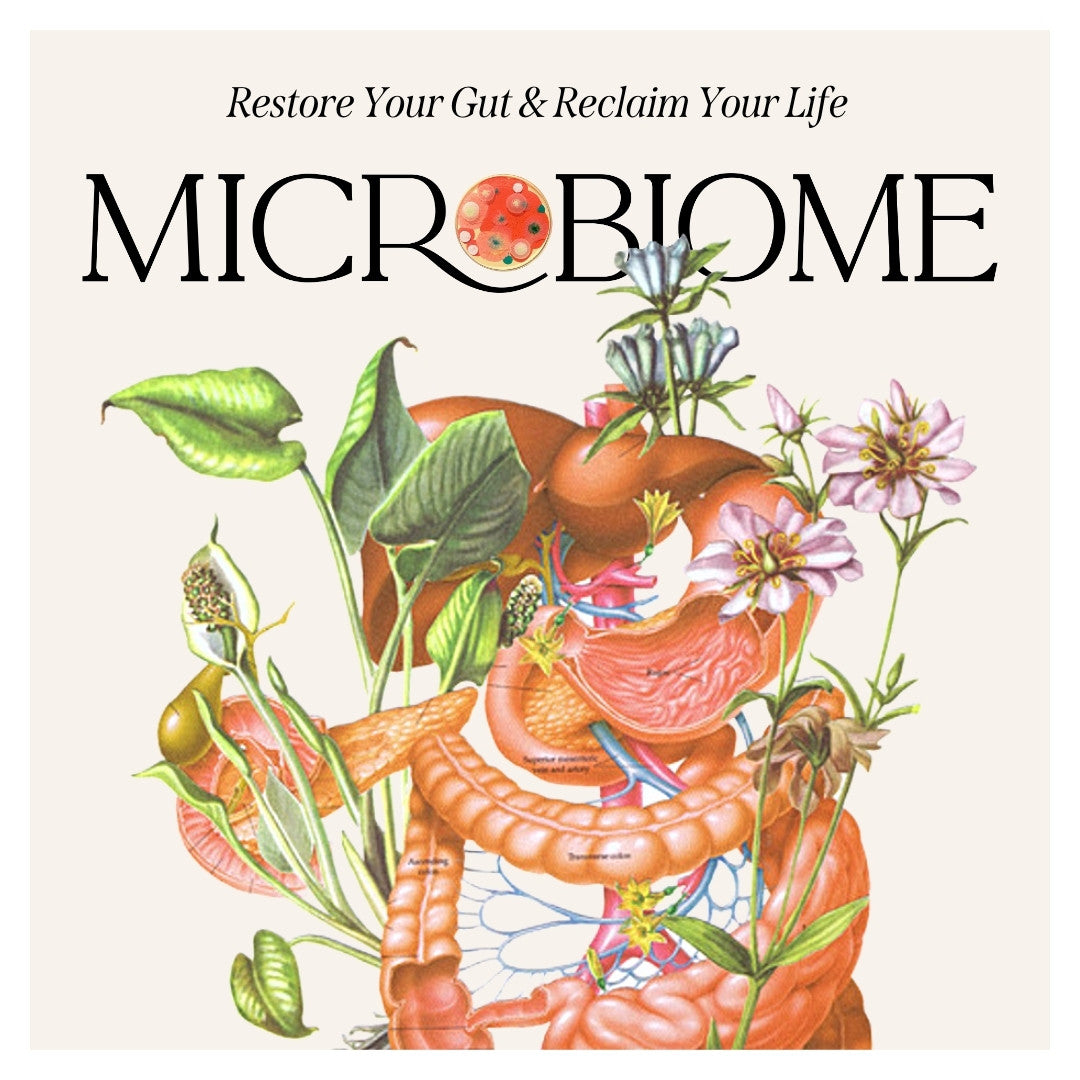

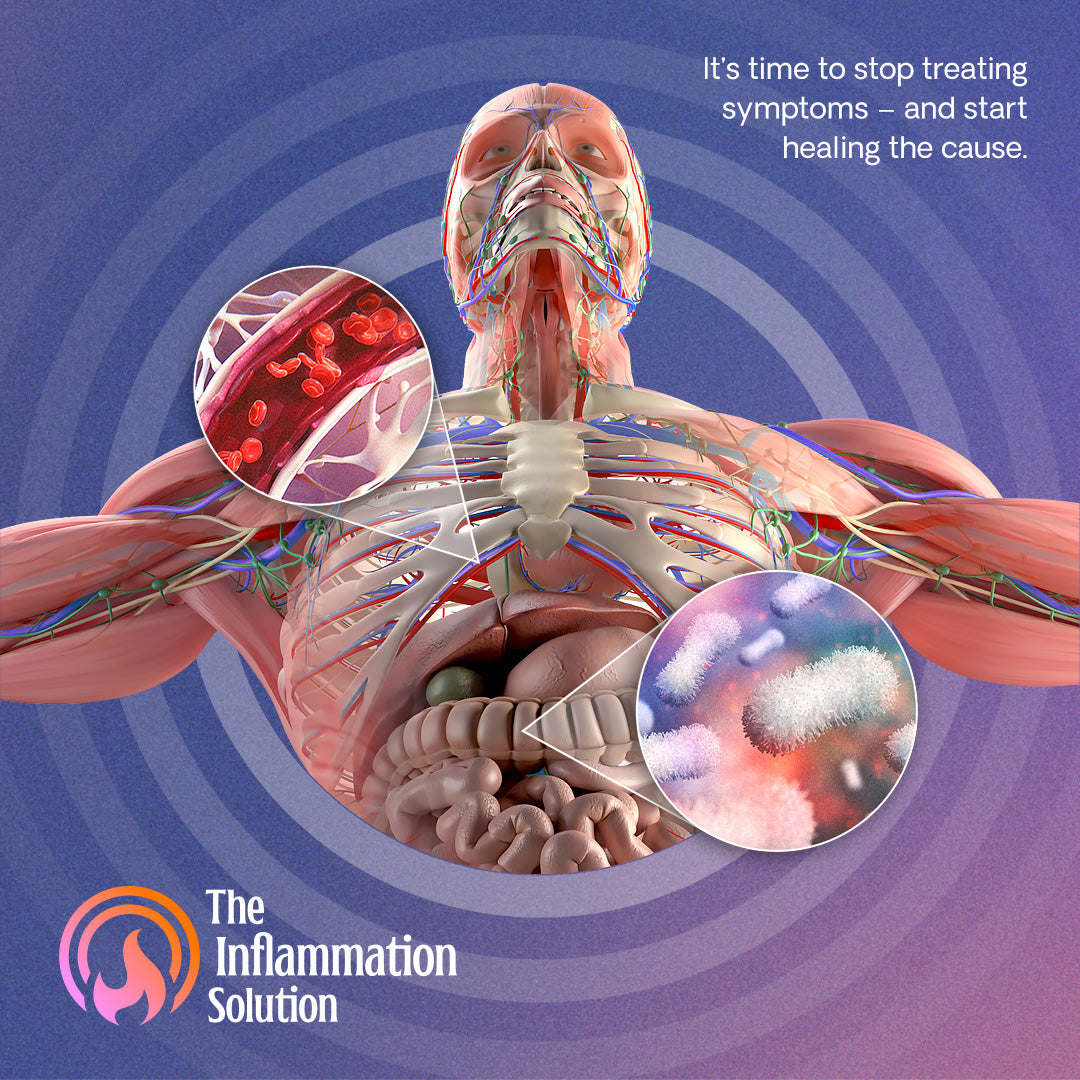

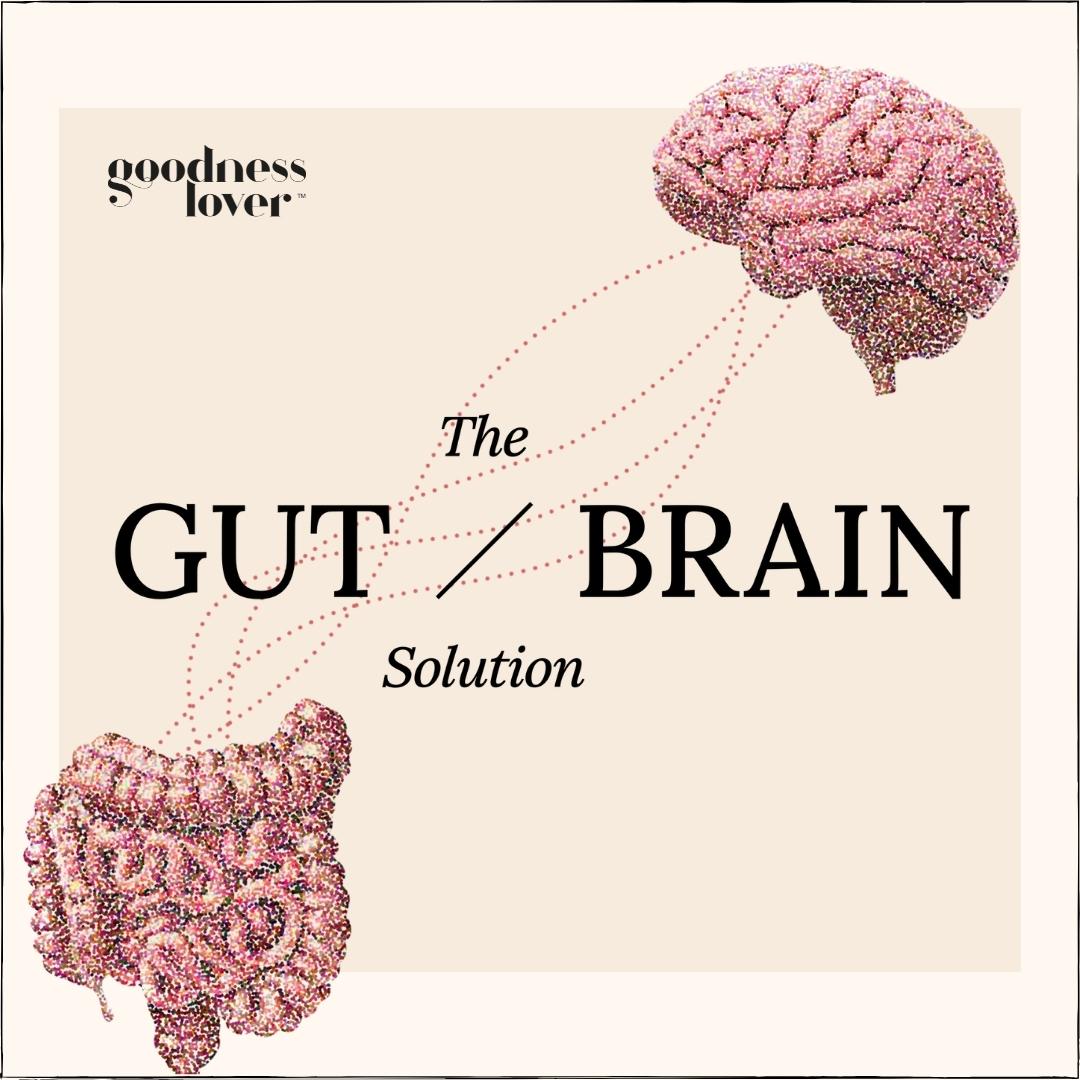

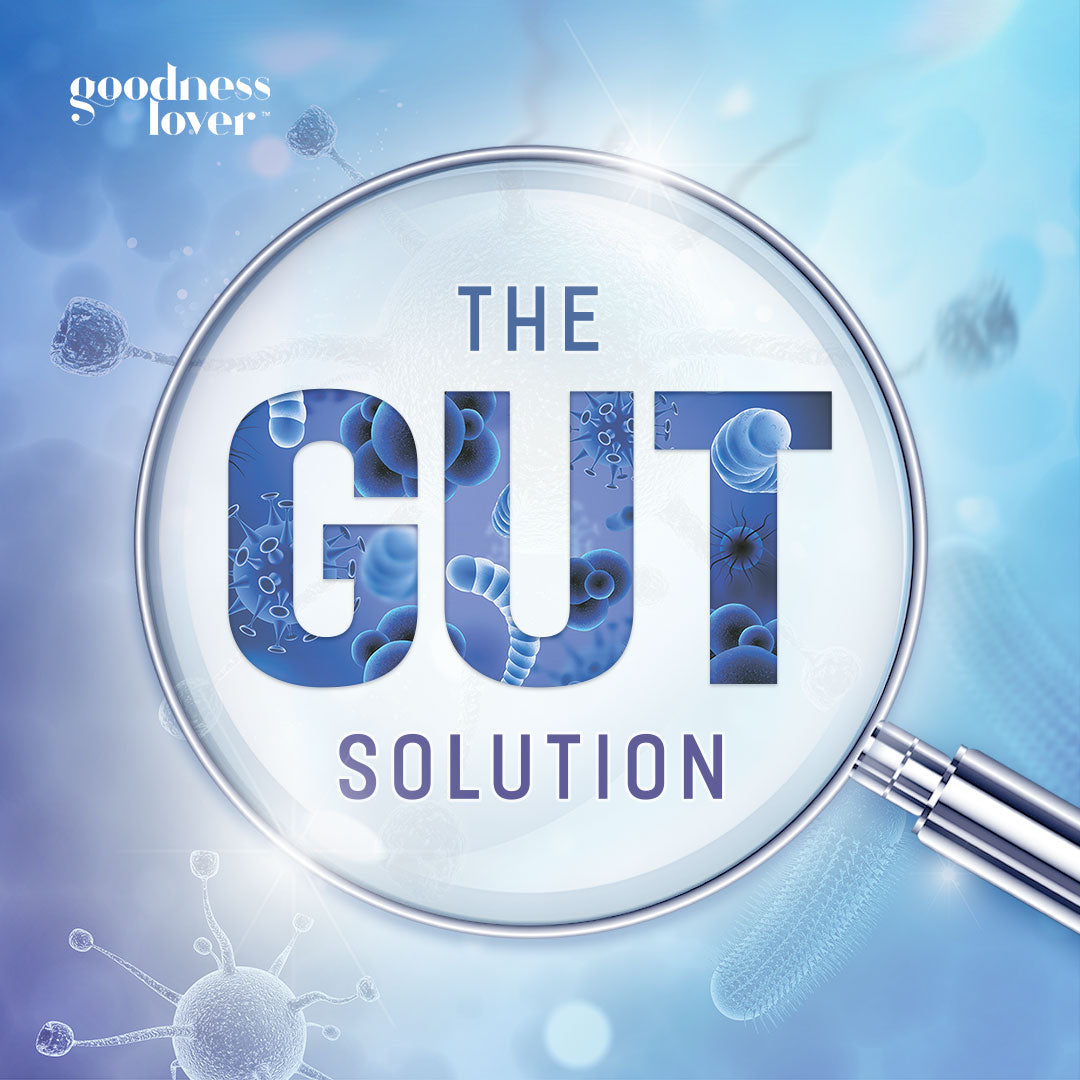

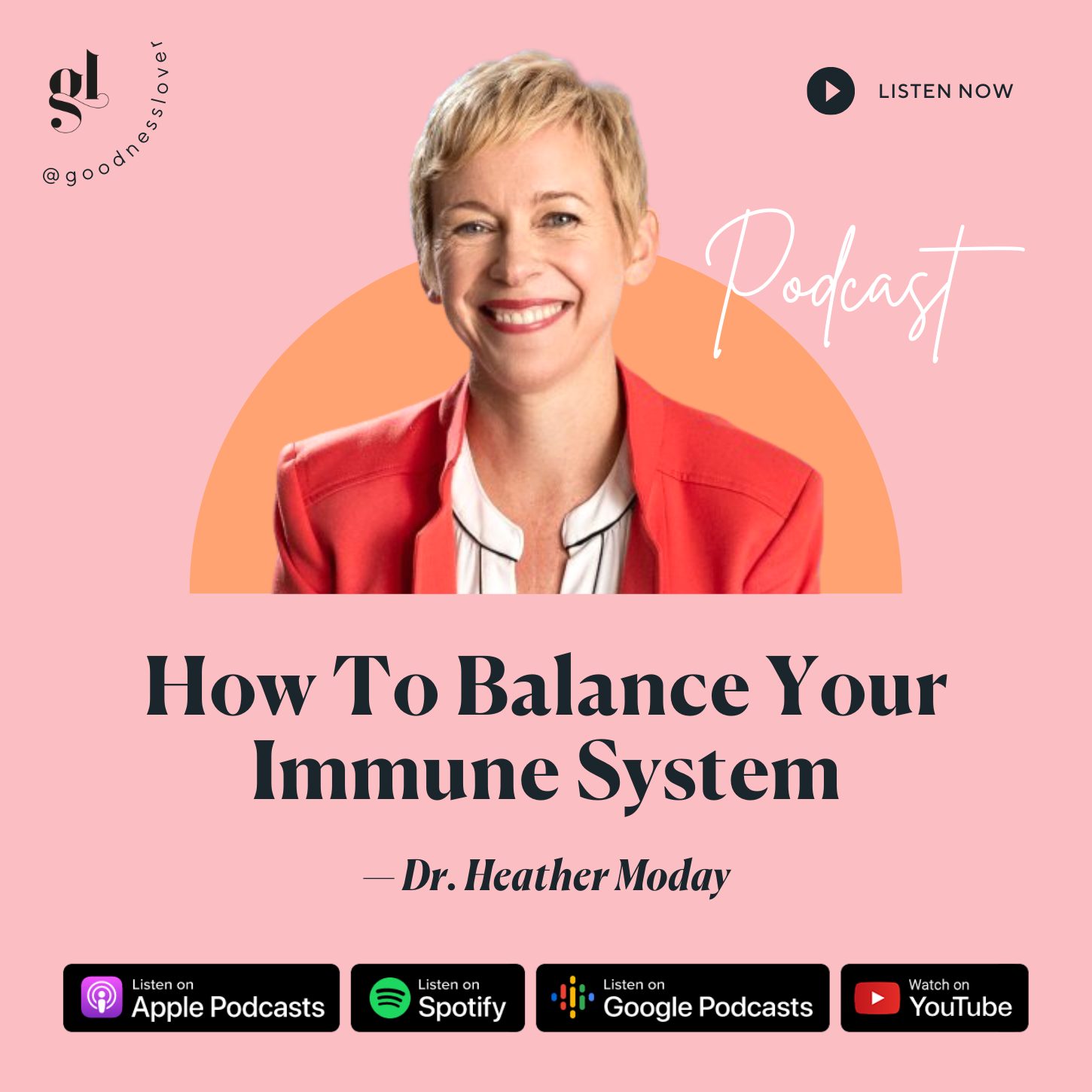
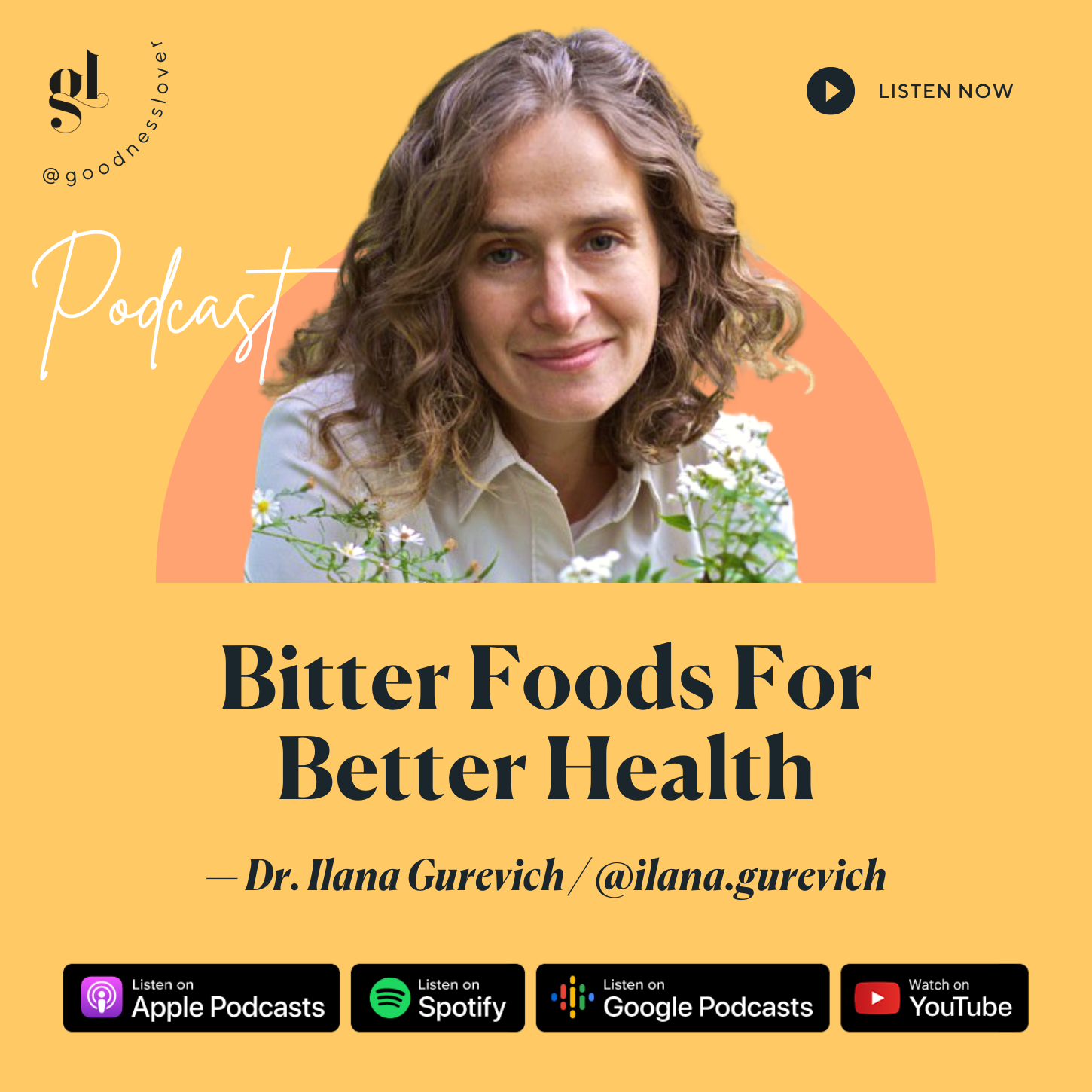

What Do You Think? Comment Below: